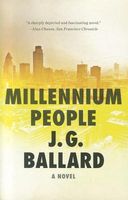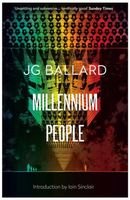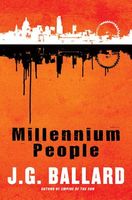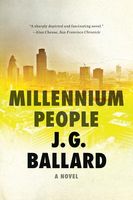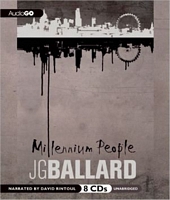- Welcome to FictionDB, Guest
- | My Account
- | Help

Millennium People — J.G. Ballard
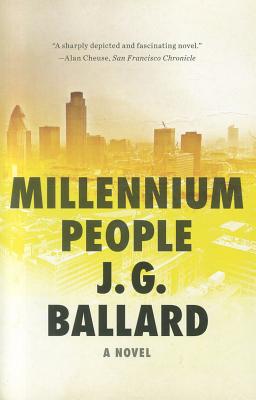
No writer, certainly no fiction writer, has examined in recent times the profound social malaise of the middle classes as presciently as Ballard, whose penultimate novel, Millennium People, a brilliant political satire, is filled with stunning psychological insights, twisted humor, and unrelenting suspense.
When a bomb goes off at Heathrow Airport it looks like another random act of violence to psychologist David Markham. But then he discovers that his ex-wife Laura is among the victims. Following a police lead that suggests the explosion was not the work of a foreign terrorist, but instead a shadowy and ruthless group based in the comfortable Thameside estate of Chelsea Marina, Markham begins to infiltrate London's fringe protest movement.
Led by Richard Gould, a charismatic pediatrician turned cult leader, the clandestine group aims to rouse London's squeezed middle classes to anger and violence, to free them from both the self-imposed burdens of civic responsibility and the trappings of a consumer society: private schools, foreign nannies, health insurance, and overpriced housing. But when Markham becomes enamored with an exotic film studies professor who moonlights as a terrorist cell leader, he too gets caught up in the idealistic campaign spiraling rapidly out of control. At last succumbing to the irresistible charms of Gould, the group's leader, Markham abandons his original investigation to give his unyielding support to the uprising, becoming an active participant in the process.
As widespread rioting erupts and England's capital city becomes a crucible of existential rage, a frenzied English populous begins destroying the very symbols that define their middle-class status, setting fire to Volvos, destroying travel agencies, and smoke-bombing department stores. In an unnerving and prophetic ending that is so jarring it will resonate well beyond the confines of fiction, Millennium People becomes more than a novel; it becomes a shockingly plausible, deeply unsettling vision of society in collapse, one that, in the words of John Gray in the New Statesman, "dissects the perverse psychology that links terrorists with their innocent victims."
When a bomb goes off at Heathrow Airport it looks like another random act of violence to psychologist David Markham. But then he discovers that his ex-wife Laura is among the victims. Following a police lead that suggests the explosion was not the work of a foreign terrorist, but instead a shadowy and ruthless group based in the comfortable Thameside estate of Chelsea Marina, Markham begins to infiltrate London's fringe protest movement.
Led by Richard Gould, a charismatic pediatrician turned cult leader, the clandestine group aims to rouse London's squeezed middle classes to anger and violence, to free them from both the self-imposed burdens of civic responsibility and the trappings of a consumer society: private schools, foreign nannies, health insurance, and overpriced housing. But when Markham becomes enamored with an exotic film studies professor who moonlights as a terrorist cell leader, he too gets caught up in the idealistic campaign spiraling rapidly out of control. At last succumbing to the irresistible charms of Gould, the group's leader, Markham abandons his original investigation to give his unyielding support to the uprising, becoming an active participant in the process.
As widespread rioting erupts and England's capital city becomes a crucible of existential rage, a frenzied English populous begins destroying the very symbols that define their middle-class status, setting fire to Volvos, destroying travel agencies, and smoke-bombing department stores. In an unnerving and prophetic ending that is so jarring it will resonate well beyond the confines of fiction, Millennium People becomes more than a novel; it becomes a shockingly plausible, deeply unsettling vision of society in collapse, one that, in the words of John Gray in the New Statesman, "dissects the perverse psychology that links terrorists with their innocent victims."
Click on any of the links above to see more books like this one.
